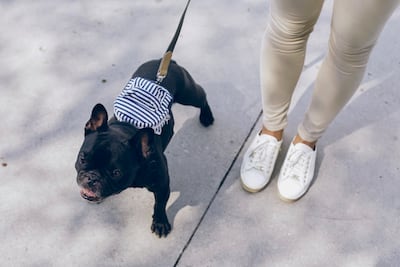Their faces were so hard to resist. Yet their costs – as offices, travel and entertainment options reopen – are leading to some delayed financial shock.
Pets famously provided solace for isolated Americans during the height of the Covid-19 pandemic. US consumers purchased some 47 million of them in 2020, according to VitusVet, which provides services to vets. A whopping 10 million of those were dogs.
When much of the workforce was remote, keeping a new pet was easy and fairly cheap. Who needed doggy day care when every day was a day at home?
But with offices reopening and travel rebounding, pet owners say their expenses are rising steeply, approaching amounts some people might shell out for their own (human) rent. While few admit they regret their purchases, many say they are readjusting their budgets to accommodate the high price of pet ownership.
Josephine Hendrix, 38, a literacy coach who lives in Brooklyn's Dumbo district, is one such pet owner. Last year, she bought Bowie, a seven-month-old sheepadoodle. (That is a mix between an Old English sheepdog and a poodle.)
“We knew living in New York would be a premium and we figured having a dog would be no exception,” she says.
Ms Hendrix estimates that she and her husband now spend about $800 a month on doggy day care alone. That is in addition to vet visits (at least $100 every time), food ($120 for a delivery service each month) and toys ($26 a month for a BarkBox subscription).
Ms Hendrix has also spent about $400 replacing Bowie’s crates as he outgrows them, another $350 for a recent emergency vet visit and $400 for his recent bout of giardia, a parasite that puppies can contract. (Bowie is fine now.)
The added expenses are not life-changing but they have encouraged the couple to rethink their overall spending.
“Day care is definitely double the price of a dog walker. But day care was double the benefit for a puppy because of the socialisation
Josephine Hendrix,
dog owner
“Day care is definitely double the price of a dog walker, we did the maths,” Ms Hendrix says. “But we also thought that day care was double the benefit for a puppy because of the socialisation.”
She and her husband are cutting back on eating out and shopping at expensive delis. They also now park their car on the street instead of paying for a garage.
For people who do not own dogs, this might seem appear to be a significant lifestyle change. But pet industry executives and analysts say it represents a shift in the way people think about animal ownership.
More than 75 per cent of millennial and Gen Z consumers “believe that their pets are an integral part of the family”, according to Jeffrey Simmons, chief executive of Elanco Animal Health. As such, they have increased expectations of the care needed for their pets and are willing to make sacrifices.
In one survey by Realtor.com, about 75 per cent of homebuyers with pets said they would pass up an otherwise ideal property if it was not right for their animal companions.
Sarah Mogin, 34, a software developer who lives in Brooklyn Heights, is finding that in a reopened economy, she has to make some new sacrifices for her dog, Julian, a chihuahua.
At the moment, Julian can only stand to be away from his owner for about two hours.
“We can probably build that up, but that is where he is at right now,” Ms Mogin says.
That means she has to put him in day care when she goes into her office. Her company is not requiring her to return to the office but she enjoys going in three days a week to see colleagues and put some separation between her work life and home life.
Ms Mogin estimates she is spending about $600 a month on Julian’s day care, with each day costing about $50.
“It is definitely more expensive for me to go back to the office,” she says.
Then there is pet insurance for $50 a month, $15 for nail trims every four weeks and $140 for a six-month supply of flea and tick medicine, along with food, toys and vet visits.
It is definitely more expensive for me to go back to the office. He’s [pet] definitely worth it all, I love him so much
Sarah Mogin,
pet owner
Once, she had to rush Julian to the vet because he could not stop throwing up (he has since recovered), and the bill was $791. Pet insurance reimbursed $482 but that still left her with an unexpected cost of $309.
“He is definitely worth it all, I love him so much,” Ms Mogin says. “I look at him and I get happy. He has this cute little trot when we are walking.”
A June survey from the American Pet Products Association found that spending on pets has increased overall since the pandemic began. About 35 per cent of US pet owners said they had spent more money on their pets in the previous 12 months than in the preceding year.
Pet-sitting businesses have been a huge beneficiary of that spending.
The phone at Pups & Pals Pet Lounge in Austin, Texas, rings at least 10 times a day with calls from potential new clients, according to DeDe Lally, the owner of its two locations.
“We have 250 names on our waiting list at each location, a total of 500 names that are not our clients but want to be,” she says. “It is just exploding right now.”
At Animal Loving Care in Brooklyn, the waiting list is 70 pets long, according to Adrienne Preuss, the owner.
“We are a smaller day care,” Mr Preuss says. “We are at maximum every single day.”
It is a similar story across town at Harlem Doggie Day Spa, where owner Brian Taylor says business is surging and dog owners all seem to want three to five days of care a week, corresponding to the readjusted office attendance in the new hybrid-work world.
“I am scrambling to look for new employees,” Mr Taylor says.
The hunt for labour is one of the ways in which the pet care industry is being affected by the more general strains on the recovering economy.
At a time when supply-chain disruptions have led to shortages of everything from furniture to golf clubs, pet food supplies are also under pressure, according to Dana Brooks, president and chief executive of the Pet Food Institute.
I am scrambling to look for new employees
Brian Taylor,
owner, Harlem Doggie Day Spa
The average dog owner spent $287 on food last year, up from $259 in 2018, according to the American Pet Products Association’s latest survey.
Despite the costs, Ms Hendrix has no regrets about buying Bowie. She would buy another dog if her building allowed it.
“I am already wondering if we can clone him,” she says.
Bloomberg
Abu Dhabi Sustainability Week
The Melbourne Mercer Global Pension Index
The Melbourne Mercer Global Pension Index
Mazen Abukhater, principal and actuary at global consultancy Mercer, Middle East, says the company’s Melbourne Mercer Global Pension Index - which benchmarks 34 pension schemes across the globe to assess their adequacy, sustainability and integrity - included Saudi Arabia for the first time this year to offer a glimpse into the region.
The index highlighted fundamental issues for all 34 countries, such as a rapid ageing population and a low growth / low interest environment putting pressure on expected returns. It also highlighted the increasing popularity around the world of defined contribution schemes.
“Average life expectancy has been increasing by about three years every 10 years. Someone born in 1947 is expected to live until 85 whereas someone born in 2007 is expected to live to 103,” Mr Abukhater told the Mena Pensions Conference.
“Are our systems equipped to handle these kind of life expectancies in the future? If so many people retire at 60, they are going to be in retirement for 43 years – so we need to adapt our retirement age to our changing life expectancy.”
Saudi Arabia came in the middle of Mercer’s ranking with a score of 58.9. The report said the country's index could be raised by improving the minimum level of support for the poorest aged individuals and increasing the labour force participation rate at older ages as life expectancies rise.
Mr Abukhater said the challenges of an ageing population, increased life expectancy and some individuals relying solely on their government for financial support in their retirement years will put the system under strain.
“To relieve that pressure, governments need to consider whether it is time to switch to a defined contribution scheme so that individuals can supplement their own future with the help of government support,” he said.
Teaching your child to save
Pre-school (three - five years)
You can’t yet talk about investing or borrowing, but introduce a “classic” money bank and start putting gifts and allowances away. When the child wants a specific toy, have them save for it and help them track their progress.
Early childhood (six - eight years)
Replace the money bank with three jars labelled ‘saving’, ‘spending’ and ‘sharing’. Have the child divide their allowance into the three jars each week and explain their choices in splitting their pocket money. A guide could be 25 per cent saving, 50 per cent spending, 25 per cent for charity and gift-giving.
Middle childhood (nine - 11 years)
Open a bank savings account and help your child establish a budget and set a savings goal. Introduce the notion of ‘paying yourself first’ by putting away savings as soon as your allowance is paid.
Young teens (12 - 14 years)
Change your child’s allowance from weekly to monthly and help them pinpoint long-range goals such as a trip, so they can start longer-term saving and find new ways to increase their saving.
Teenage (15 - 18 years)
Discuss mutual expectations about university costs and identify what they can help fund and set goals. Don’t pay for everything, so they can experience the pride of contributing.
Young adulthood (19 - 22 years)
Discuss post-graduation plans and future life goals, quantify expenses such as first apartment, work wardrobe, holidays and help them continue to save towards these goals.
* JP Morgan Private Bank
FA Cup quarter-final draw
The matches will be played across the weekend of 21 and 22 March
Sheffield United v Arsenal
Newcastle v Manchester City
Norwich v Derby/Manchester United
Leicester City v Chelsea
Meydan racecard:
6.30pm: Handicap | US$135,000 (Dirt) | 1,400 metres
7.05pm: Handicap | $135,000 (Turf) | 1,200m
7.40pm: Dubai Millennium Stakes | Group 3 | $200,000 (T) | 2,000m
8.15pm: UAE Oaks | Group 3 | $250,000 (D) | 1,900m
8.50pm: Zabeel Mile | Group 2 | $250,000 (T) | 1,600m
9.20pm: Handicap | $135,000 (T) | 1,600m
Timeline
2012-2015
The company offers payments/bribes to win key contracts in the Middle East
May 2017
The UK SFO officially opens investigation into Petrofac’s use of agents, corruption, and potential bribery to secure contracts
September 2021
Petrofac pleads guilty to seven counts of failing to prevent bribery under the UK Bribery Act
October 2021
Court fines Petrofac £77 million for bribery. Former executive receives a two-year suspended sentence
December 2024
Petrofac enters into comprehensive restructuring to strengthen the financial position of the group
May 2025
The High Court of England and Wales approves the company’s restructuring plan
July 2025
The Court of Appeal issues a judgment challenging parts of the restructuring plan
August 2025
Petrofac issues a business update to execute the restructuring and confirms it will appeal the Court of Appeal decision
October 2025
Petrofac loses a major TenneT offshore wind contract worth €13 billion. Holding company files for administration in the UK. Petrofac delisted from the London Stock Exchange
November 2025
180 Petrofac employees laid off in the UAE
THE BIO
Favourite car: Koenigsegg Agera RS or Renault Trezor concept car.
Favourite book: I Am Pilgrim by Terry Hayes or Red Notice by Bill Browder.
Biggest inspiration: My husband Nik. He really got me through a lot with his positivity.
Favourite holiday destination: Being at home in Australia, as I travel all over the world for work. It’s great to just hang out with my husband and family.
Zayed Sustainability Prize
info-box
COMPANY PROFILE
Company name: Happy Tenant
Started: January 2019
Co-founders: Joe Moufarrej and Umar Rana
Based: Dubai
Sector: Technology, real-estate
Initial investment: Dh2.5 million
Investors: Self-funded
Total customers: 4,000
Top tips to avoid cyber fraud
Microsoft’s ‘hacker-in-chief’ David Weston, creator of the tech company’s Windows Red Team, advises simple steps to help people avoid falling victim to cyber fraud:
1. Always get the latest operating system on your smartphone or desktop, as it will have the latest innovations. An outdated OS can erode away all investments made in securing your device or system.
2. After installing the latest OS version, keep it patched; this means repairing system vulnerabilities which are discovered after the infrastructure components are released in the market. The vast majority of attacks are based on out of date components – there are missing patches.
3. Multi-factor authentication is required. Move away from passwords as fast as possible, particularly for anything financial. Cybercriminals are targeting money through compromising the users’ identity – his username and password. So, get on the next level of security using fingertips or facial recognition.
4. Move your personal as well as professional data to the cloud, which has advanced threat detection mechanisms and analytics to spot any attempt. Even if you are hit by some ransomware, the chances of restoring the stolen data are higher because everything is backed up.
5. Make the right hardware selection and always refresh it. We are in a time where a number of security improvement processes are reliant on new processors and chip sets that come with embedded security features. Buy a new personal computer with a trusted computing module that has fingerprint or biometric cameras as additional measures of protection.
MATCH INFO
Uefa Champions League final:
Who: Real Madrid v Liverpool
Where: NSC Olimpiyskiy Stadium, Kiev, Ukraine
When: Saturday, May 26, 10.45pm (UAE)
TV: Match on BeIN Sports
COMPANY%20PROFILE%20
%3Cp%3E%3Cstrong%3EName%3A%3C%2Fstrong%3E%20Haltia.ai%0D%3Cbr%3E%3Cstrong%3EStarted%3A%3C%2Fstrong%3E%202023%0D%3Cbr%3E%3Cstrong%3ECo-founders%3A%3C%2Fstrong%3E%20Arto%20Bendiken%20and%20Talal%20Thabet%0D%3Cbr%3E%3Cstrong%3EBased%3A%3C%2Fstrong%3E%20Dubai%2C%20UAE%0D%3Cbr%3E%3Cstrong%3EIndustry%3A%3C%2Fstrong%3E%20AI%0D%3Cbr%3E%3Cstrong%3ENumber%20of%20employees%3A%3C%2Fstrong%3E%2041%0D%3Cbr%3E%3Cstrong%3EFunding%3A%3C%2Fstrong%3E%20About%20%241.7%20million%0D%3Cbr%3E%3Cstrong%3EInvestors%3A%3C%2Fstrong%3E%20Self%2C%20family%20and%20friends%26nbsp%3B%3C%2Fp%3E%0A
Our family matters legal consultant
Name: Hassan Mohsen Elhais
Position: legal consultant with Al Rowaad Advocates and Legal Consultants.
Lexus LX700h specs
Engine: 3.4-litre twin-turbo V6 plus supplementary electric motor
Power: 464hp at 5,200rpm
Torque: 790Nm from 2,000-3,600rpm
Transmission: 10-speed auto
Fuel consumption: 11.7L/100km
On sale: Now
Price: From Dh590,000
The Library: A Catalogue of Wonders
Stuart Kells, Counterpoint Press
Wicked: For Good
Director: Jon M Chu
Starring: Ariana Grande, Cynthia Erivo, Jonathan Bailey, Jeff Goldblum, Michelle Yeoh, Ethan Slater
Rating: 4/5
Company%20profile
%3Cp%3EName%3A%20Cashew%0D%3Cbr%3EStarted%3A%202020%0D%3Cbr%3EFounders%3A%20Ibtissam%20Ouassif%20and%20Ammar%20Afif%0D%3Cbr%3EBased%3A%20Dubai%2C%20UAE%0D%3Cbr%3EIndustry%3A%20FinTech%0D%3Cbr%3EFunding%20size%3A%20%2410m%0D%3Cbr%3EInvestors%3A%20Mashreq%2C%20others%0D%3C%2Fp%3E%0A
War 2
Director: Ayan Mukerji
Stars: Hrithik Roshan, NTR, Kiara Advani, Ashutosh Rana
Rating: 2/5
More on Quran memorisation:
Company profile
Name: GiftBag.ae
Based: Dubai
Founded: 2011
Number of employees: 4
Sector: E-commerce
Funding: Self-funded to date
UAE currency: the story behind the money in your pockets



